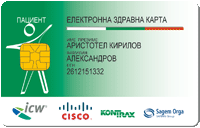Starting September, 1,000 citizens from the town of Slivnitza and the village Aldomirovzi (both some 30 kilometers away from Sofia) will receive their personal electronic health cards. Most of the cards will be handed out to chronically ill patients by their general practitioners (GPs) at their regular monthly doctor's visits. The patients involved in the project were nominated by their physicians.
 Each electronic health card is equipped with a microprocessor chip that stores the personal data of the patient, the issuer and card number as well as a security certificate. With this information, the patients insurance status and his/her assignment to a General Practitioner can automatically be checked in the project. In addition, e-prescriptions for medications covered by the Bulgarian health insurance fund will be recorded on the chip.
Each electronic health card is equipped with a microprocessor chip that stores the personal data of the patient, the issuer and card number as well as a security certificate. With this information, the patients insurance status and his/her assignment to a General Practitioner can automatically be checked in the project. In addition, e-prescriptions for medications covered by the Bulgarian health insurance fund will be recorded on the chip.
Currently, the system is tested in the field and the participating physicians and pharmacists are trained by specialists from ICW and Kontrax. After the tests and trainings, the pilot project will go live and the first e-prescriptions will be issued and filled in Bulgaria.
In the first six months since the official start of the project, the infrastructure was built and specific software solutions necessary for its operation were developed: All physician practices and pharmacies in Slivnitza, as well as the NHIF were connected with a reliable and secure private network. The network communication devices, firewalls and IP phone communications were provided by Cisco.
ICW, the project's main system integrator, has adapted its software solutions that are already used in Germany and Austria to the special requirements of the Bulgarian health system. ICW's Software Development Kit (SDK) was used to enable the seamless and easy integration between the electronic health card system and the software in the GP offices and pharmacies. Thus, data exchange between the specialized software "Hippocrates" of Kontrax, the pharmacy information systems "Pharmacy Expert" of Libra Inc., and "Pharma Star" of AS Systems was enabled using ICW eHealth infrastructure solutions.
The pilot project for the Bulgarian electronic health card was initiated by the Ministry of Health and the NHIF. Its realization was awarded to ICW in partnership with Cisco and Kontrax.
Related news articles:
- InterComponentWare AG (ICW)'s Profile
About InterComponentWare
InterComponentWare AG (ICW) is a leading international eHealth specialist with locations in Germany, the United States, Austria, Switzerland and Bulgaria. Its solutions for networking the various players in the healthcare system lastingly improve process-oriented communication and data integrity, and therefore also the quality of healthcare. Among other things, ICW develops and distributes software and hardware components for the healthcare IT infrastructure for electronic health cards, the LifeSensor personal health record as well as networking solutions for hospitals and physician offices. As part of the bIT4health consortium, ICW provided important consulting services for the implementation of the electronic health card in Germany, is involved in the Austrian eCard project and has won the pilot project for the national health card in Bulgaria. For further information, please visit: